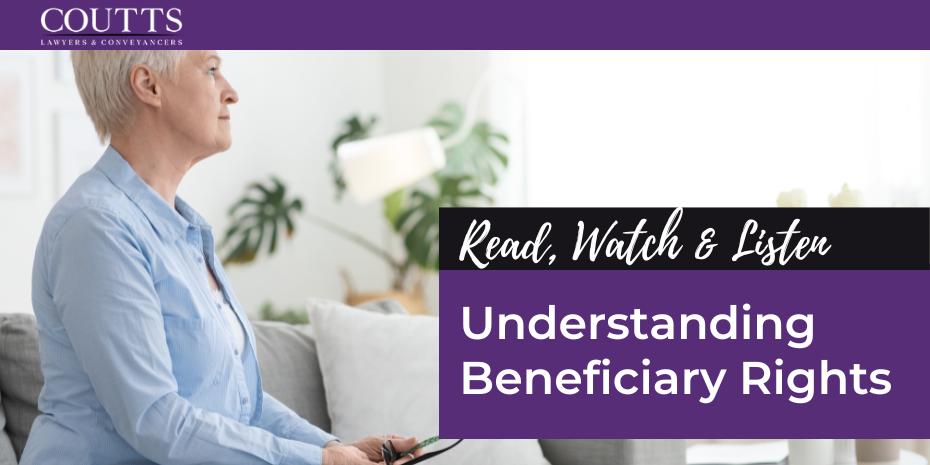We’ve Got You Covered
Our expertise extends to the vital area of wills and estate planning. We recognise the significance of ensuring your legacy is preserved and your wishes are accurately reflected. Our legal team provides thoughtful, expert advice and representation in drafting and managing wills. We work closely with you to understand your personal circumstances and objectives, ensuring your will comprehensively covers all aspects of your estate.

Kaisha Gambell
Senior Associate
Step 1: Talk To Us
Reach out to Coutts Lawyers via our website, phone, or in person for a consultation on how we can help you secure your future.
Step 2: Consultation Appointment
Schedule and attend a meeting with a Coutts lawyer to discuss the specifics of your Estate matter and desired outcomes.
Step 3: We get to work
Rest assured, we’ll meticulously take care of all the legalities and processes involved in your Estate matter.
Book Your Wills Consultation Now
Drafting a Will
When it comes to drafting your Will, the importance is in the finer details. This may seem a cliché or perhaps throw-away comment, however, many may not realise the legal requirements that must form part of your Will for it to be valid or to ensure your specific wishes are as ‘water-tight’ as possible. These legal requirements come hand in hand with specialised drafting and a broader understanding of how assets can be dealt with under your Will.
The Wills & Estates Team at Coutts Lawyers & Conveyancers can provide you with advice on all of your estate planning needs. The Team removes legalese and ensures you understand the purpose of each of your estate planning documents and that they meet your needs.
What is a Will?
A Will is a legal document that specifies who you want to benefit from your estate, and how you wish your assets to be distributed after you pass away. It is one of the most important legal documents you will ever sign, and making sure that your Will is up-to-date, well-structured and clearly written is key to ensuring that your assets will pass to the persons you wish to benefit. You can also use your will to nominate a guardian for your minor children or to record your funeral wishes. Having a valid will meets two goals – it ensures that your wishes are upheld and makes things easier for your family.
What are the legal requirements for a valid Will?
For a Will to be considered valid in New South Wales, it must be:
- In writing;
- Signed by the will-maker (or by a person the will-maker has directed to sign on their behalf if they are physically unable to sign it themselves); and
- Witnessed by at least two independent people who are present at the same time the will-maker signs the document. The witnesses must also sign the will to confirm that they were present and witnessed it.
What are the duties of an Executor?
The Executor is the person or persons you appoint in your Will to administer your estate when you pass away. The Executor has the following responsibilities:
- Making the funeral arrangements;
- Applying for a Grant of Probate from the Supreme Court of NSW;
- Paying the debts and liabilities of the deceased person;
- Collecting, selling or transferring the assets of the deceased person;
- Distributing the assets to beneficiaries who are nominated in the Will;
- Setting up and administering any trust funds that were created in the Will; and
- Dealing with any conflicts or challenges to your Will.
What happens if I pass away without a Will??
When someone passes away without a “valid Will” in place, they are said to have “died intestate”. What this means is that their assets will pass to a class of beneficiaries that have been pre-determined by the law in New South Wales, called “the rules of intestacy”.
Under the rules of intestacy, there is a statutory order of relatives created by the law to achieve a “blanket solution” to what the person who passed away without the Will might have done in their lifetime.
You must exhaust every relative who fits within the category before moving on to the next category and once an eligible relative is found, the process stops. If there is more than one relative in a category, then these relatives become equal beneficiaries of the estate.
The statutory order is as follows:
- Spouse, including a married or de-facto spouse and same-sex relationships
- Children, including biological and formally adopted children but not stepchildren
- Parents
- Brothers and sisters
- Grandparents
- Aunts and Uncles
- Cousins
The deceased person’s assets will only pass to the New South Wales Government if there are no eligible relatives of the deceased person.
The situation becomes much more complicated when the person who passed away leaves both a spouse and children who are not the biological children of their spouse, such as in a blended family scenario. In this situation, the law attempts to divide the estate assets between the spouse and the children, but it might not be exactly as the deceased person had wanted it to be.
This statutory order is subject to modification where the deceased person is an Indigenous Australian and the estate will be divided in accordance with the laws, customs and traditions of the deceased person’s Indigenous community.
What about DIY Will kits?
Having a do-it-yourself (DIY) Will or Will-kit is better than nothing, but it is certainly no substitute for professional advice and a legally drafted valid Will prepared by one of our lawyers.
The biggest problem with DIY Wills that we see is it is so easy to get them wrong! Even the simplest mistakes can cause unintended consequences, or the will is held to be invalid.
Some of the most common mistakes we see are:
- Attempting to give away assets you don’t own – Your will can only dispose of assets that you own in your name on the date of your death. You are not able to include assets that you own jointly with another person, and you are not able to give away your superannuation or life insurance benefits either.
- Being too specific – If the Will lists all the assets owned by the Will-maker such as their house, car, and bank account, but fails to include a “catch-all” clause for the assets they might forget about, like employee entitlements, then these forgotten assets will be distributed in accordance with the rules of intestacy and pass to a class of beneficiaries determined by the law.
- Illegible handwriting – It’s simple, if no one can read your Will, then you cannot be certain that your wishes will be upheld.
- Failing to comply with the basic legal formalities for valid Wills by having the correct signatures and witnesses.
When is it the right time to make a new Will?
You should consider making a new Will if:
- You have purchased a new house or inherited assets of your own.
- You become married or enter into a new de-facto relationship.
- You have children or formally adopt children.
- You become separated or formally divorced from a spouse.
If you already have a Will, you should frequently review your will and update it if:
- Your assets substantially change.
- Your children are now adults, and you have grandchildren.
- Someone you have named as an executor or beneficiary has passed away or is no longer suitable.
- You have changed your mind.
Book Your Wills Consultation Now
Introducing Kaisha
Your Compassionate Lawyer
Meet Kaisha, a Senior Associate at Coutts Lawyers & Conveyancers, and the head of our esteemed Wills & Estates Law team. With her wealth of experience, Kaisha’s blend of empathy and thoroughness not only helps her foster genuine connections with her clients but also cements her reputation as a top-tier authority in Wills & Estates law.


Connect with Kaisha Today
Multi Award-Winning
Law Firm

Wills FAQ’s
A legally valid Will must be in writing, signed by the will-maker or someone they have directed, and witnessed by at least two independent people, who must also sign the document.
A handwritten Will that is illegible can create serious problems in interpretation, potentially leading to disputes and may render the Will invalid if the wishes of the will-maker cannot be ascertained.
When someone dies without a valid Will, they die intestate, and their assets are distributed according to the pre-determined statutory order of relatives known as the rules of intestacy, or to the New South Wales Government if no eligible relatives are found.
Professional advice ensures compliance with legal requirements, avoids common pitfalls and mistakes, and helps in drafting a clear and well-structured Will, reducing the risk of disputes and ensuring the will-maker’s wishes are accurately represented.
A well-drafted Will provides clarity and certainty about your wishes, ensures the smooth distribution of assets according to your instructions, and reduces the possibility of conflicts or disputes among beneficiaries, thereby providing peace of mind to your loved ones.
Download your FREE Estate Planning Guide!



